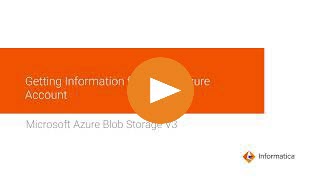
Operation | Support |
|---|---|
Read | Yes |
Write | Yes |

Property | Description |
|---|---|
Connection Name | Name of the connection. Each connection name must be unique within the organization. Connection names can contain alphanumeric characters, spaces, and the following special characters: _ . + -, Maximum length is 255 characters. |
Account Name | Microsoft Azure Blob Storage account name. |
Authentication Type | Authentication type to access the Microsoft Azure Blob Storage account. Select one of the following options:
|
Account Key | Applies to shared key authentication. The account key for the Microsoft Azure Blob Storage account. |
SAS Token | Applies to shared access signature. The shared access signature token generated in the Azure portal. |
Container Name | Microsoft Azure Blob Storage container name. |
Endpoint Suffix | Type of Microsoft Azure endpoints. Select one of the following options:
Default is core.windows.net. |
Property | Description |
|---|---|
Number of concurrent connections to Blob Store | The number of concurrent connections to Blob Store to upload files. Default is 4. |
Source Type | Select the type of source from which you want to read data. You can select the following source types:
Default is File. |
Blob Name Override | Overrides the default file name. |
Blob Container Override | Overrides the default container name. When you read data from a directory and override the Blob container, ensure that files in the Blob container that you override with are not empty. When you generate the SAS token at the container-level, the default container name and the container name that you specify for the container override must be the same. |
Compression Format | Decompresses data when you read data from Microsoft Azure Blob Storage. You can decompress the data in the following formats:
Default is None. |
Property | Description |
|---|---|
Number of concurrent connections to Blob Store | The number of concurrent connections to Blob Store to upload files. Default is 4. |
Source Type | Select the type of source from which you want to read data. You can select the following source types:
Default is File. |
Blob Name Override | Overrides the default file name. |
Blob Container Override | Overrides the default container name. When you read data from a directory and override the Blob container, ensure that files in the Blob container that you override with are not empty. When you generate the SAS token at the container-level, the default container name and the container name that you specify for the container override must be the same. |
Compression Format | Decompresses data when you read data from Microsoft Azure Blob Storage. You can decompress the data in the following formats:
Default is None. |